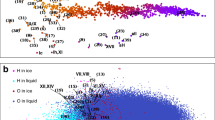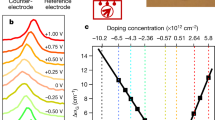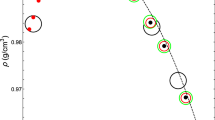Abstract
The dipole moment of a water molecule in liquid water differs from that of the isolated molecule because each molecule is further polarized by the electric field of the surrounding molecules. The effective dipole moment has to be known before a satisfactory statistical mechanical study of water and aqueous solutions is possible. One approach is to study ice rather than water because it has a known, simple structure. However, the recent literature on the theory of the dielectric constant of ice is confused and contradictory; for example, there are two rival theoretical expressions for the dielectric constant in terms of the dipole moment. A simple resolution of this ‘internal field’ problem is proposed here. It is further shown that the Bernal–Fowler–Pauling ice-rules model of ice behaves like a dielectric material, and matching the results of calculations on this model to experiment gives a dipole moment of 3.0 D.
This is a preview of subscription content, access via your institution
Access options
Subscribe to this journal
Receive 51 print issues and online access
$199.00 per year
only $3.90 per issue
Buy this article
- Purchase on Springer Link
- Instant access to full article PDF
Prices may be subject to local taxes which are calculated during checkout
Similar content being viewed by others
References
Bernal, J. D. & Fowler, R. H. J. chem. Phys. 1, 515–548 (1933).
Pauling, L. J. Am. chem. Soc. 57, 2680–2684 (1935).
Nagle, J. F. J. Math. Phys. 7, 1484–1491 (1966).
Nagle, J. F. Chem. Phys. 43, 317–328 (1979).
Onsager, L. & Runnels, L. K. J. chem. Phys. 50, 1089–1103 (1969).
Buckingham, A. D. in MTP International Review of Science, Physical Chemistry Series 1, Vol. 2, (ed. Alien, G.) 241–264 (Butterworth, London, 1972).
Fröhlich, H. Theory of Dielectrics 2nd edn (Oxford University Press, 1958).
Kirkwood, J. G. J. chem. Phys. 7, 911–919 (1939).
De Leeuw, S., Perram, J. W. & Smith, E. R. Proc. R. Soc. A373, 27–56; 57–66 (1980).
Pollock, E. L. & Alder, B. J. Physica 102A, 1–21 (1980).
Nagle, J. F. J. chem. Phys. 61, 883–888 (1974).
Nagle, J. F. J. Glaciol. 21, 73–81 (1978).
Yanagawa, A. & Nagle, J. F. Chem. Phys. 43, 329–339 (1979).
Johari, G. P. & Whalley, E. J. chem. Phys. 72, 3201–3205 (1980).
Stillinger, F. H. & Cotter, M. A. J. chem. Phys. 58, 2532–2541 (1973).
Hollins, G. T. Proc. phys. Soc. 84, 1001–1016 (1964).
Rahman, A. & Stillinger, F. H. J. chem. Phys. 57, 4009–4017 (1972).
Gobush, W. & Hoeve, C. A. J. J. chem. Phys. 57, 3416–3421 (1972).
Whalley, E. J. Glaciol. 21, 13–31 (1978).
Author information
Authors and Affiliations
Rights and permissions
About this article
Cite this article
Adams, D. Theory of the dielectric constant of ice. Nature 293, 447–449 (1981). https://doi.org/10.1038/293447a0
Received:
Accepted:
Issue Date:
DOI: https://doi.org/10.1038/293447a0
This article is cited by
-
The polarizing forces of water
Theoretical Chemistry Accounts (2012)
-
Dielectric constant of ice
Nature (1982)
Comments
By submitting a comment you agree to abide by our Terms and Community Guidelines. If you find something abusive or that does not comply with our terms or guidelines please flag it as inappropriate.



